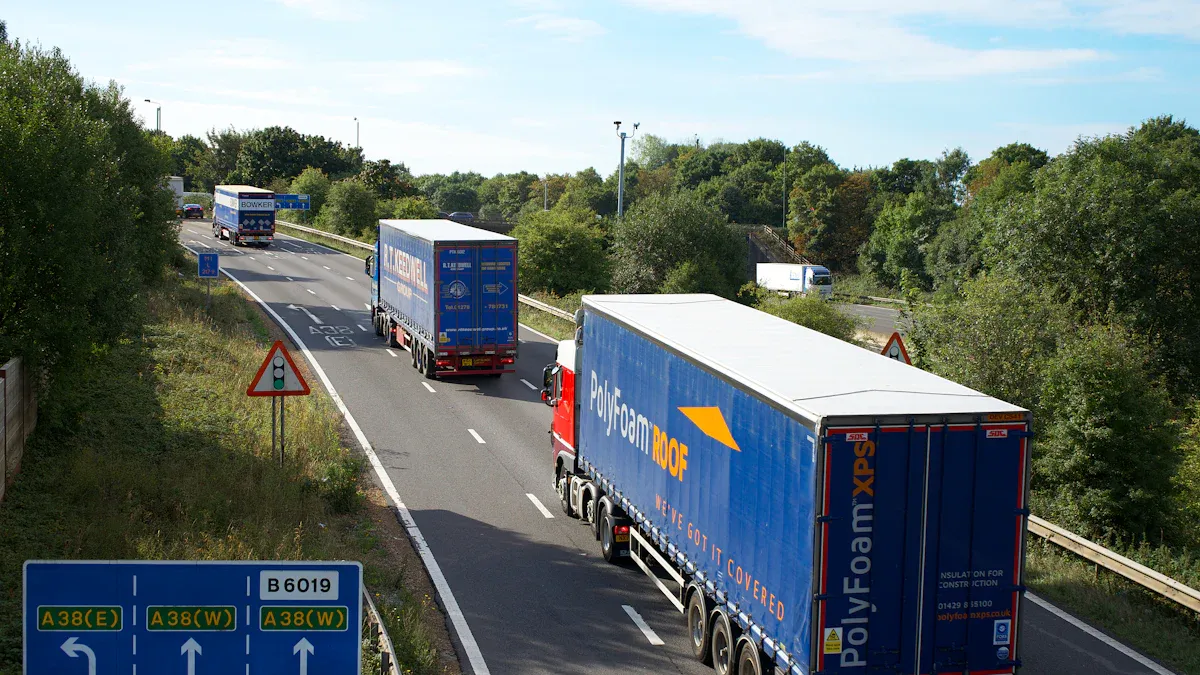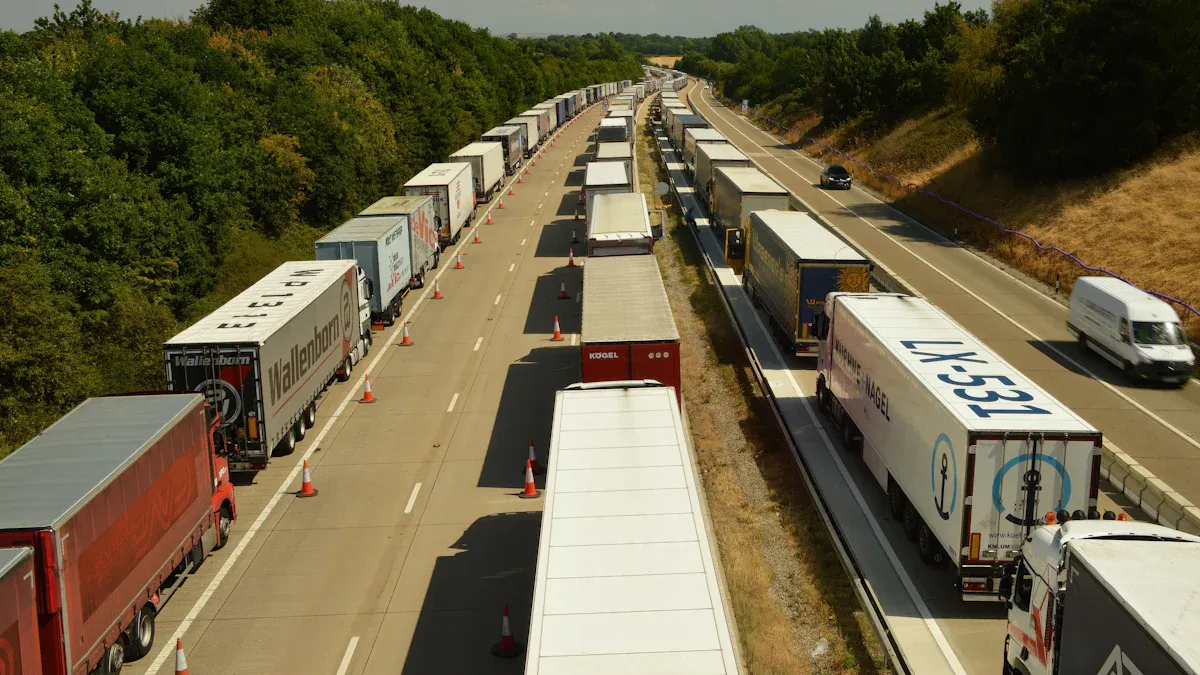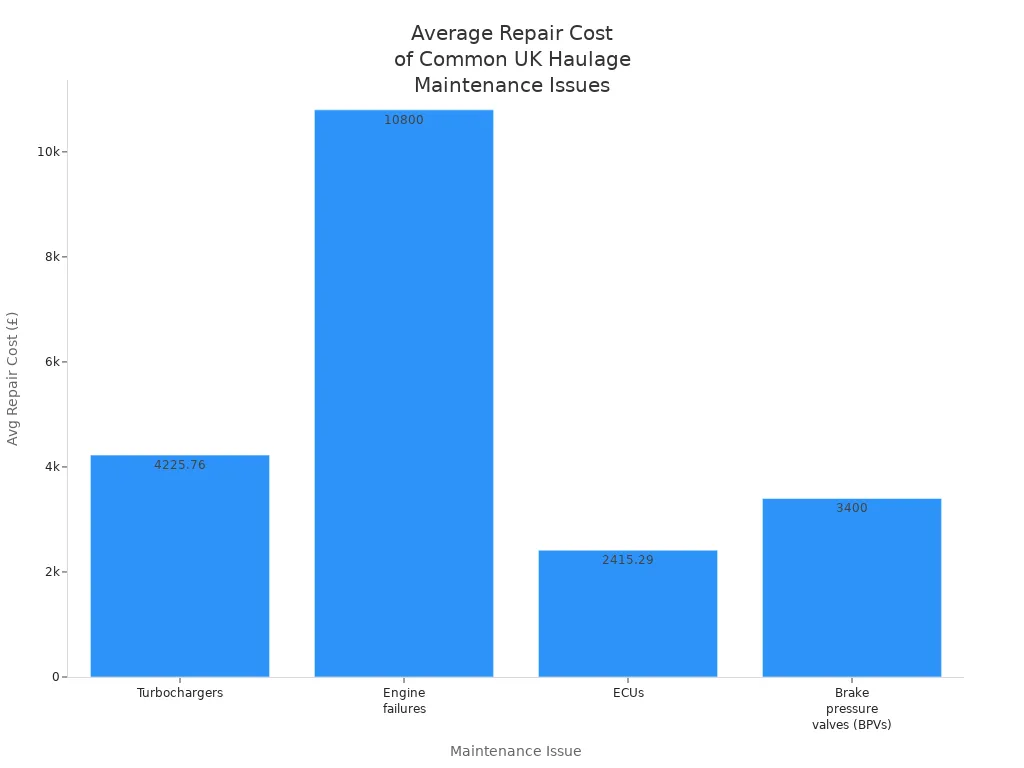
You deal with many ongoing UK road haulage industry challenges each day. You have to keep your vehicles and drivers safe all the time. The road freight transport market in the UK went down in 2021. This happened because of lockdowns during the coronavirus pandemic. You need to follow strict rules and meet high standards. You can use technology to help you watch safety and follow the rules better. If you act early and keep a close eye on things, you protect your business and everyone on the road.
Key Takeaways
- Regular vehicle maintenance is very important. It stops breakdowns and accidents. This saves money and keeps people safe.
- Watch driver fatigue carefully. Make clear rest rules. Tell drivers to take breaks. This lowers the chance of accidents.
- Use technology to help follow the rules. Digital tools track maintenance and driver hours. This makes it easier to obey the rules.
- Stay involved as a manager. Watch over things closely. This helps keep everyone safe and following the rules. It also protects your business’s good name.
- Watch out for unfair competition. Be open about how you work. This builds trust and keeps industry standards high.
UK Road Haulage Industry Challenges

The UK road haulage industry has many problems that do not go away. These problems make your work harder every day. Some of these are maintenance issues, driver fatigue, and manager accountability. Each problem can hurt safety, compliance, and your business’s reputation.
Maintenance Issues
You need to keep your vehicles working well to stop breakdowns and accidents. Maintenance problems happen a lot in the UK road haulage industry. The most common and expensive problems are with turbochargers, engine failures, ECUs, NOx sensors, and brake pressure valves. The table below shows how much repairs cost and what usually goes wrong:
| Maintenance Issue | Average Repair Cost | Common Failures |
|---|---|---|
| Turbochargers | £4,225.76 | Third most frequent failure |
| Engine failures | £10,800 | Major component failure |
| ECUs | £2,415.29 | Age-related wear |
| NOx sensors | N/A | Most common failure (13.84%) |
| Brake pressure valves (BPVs) | £3,400 | High-risk item |

Engine failures can cost more than £10,000 to fix. NOx sensors break the most, almost 14% of all failures. These problems can cause your trucks to stop working and cost you more money. If you do not fix them fast, accidents can happen. Doing regular checks and repairs helps you avoid these problems and keeps your vehicles safe.
Fatigue and Conduct
Driver fatigue is a big problem in the UK road haulage industry. Many drivers work long hours and at odd times. This makes them tired and less careful. Fatigue makes accidents more likely, especially for HGV drivers. Here are some important facts about driver fatigue:
- Driver fatigue is a big problem for UK road haulage drivers, especially HGV drivers.
- Working at odd hours makes drivers tired and raises accident risk.
- Driving more than eight hours doubles the chance of an accident.
- Not getting enough sleep causes many fatigue-related accidents for HGV drivers.
You also need to watch how drivers act. Following hours-of-service rules is not just to avoid fines. Breaking these rules can mean fines up to £1,500 each time. Drivers can lose their licenses if they do not follow the rules. Accidents from fatigue can hurt your company’s reputation and make insurance cost more. Research shows commercial vehicles are in about 25% of all road deaths in the UK. This shows why following driving rules is so important for safety.
Manager Accountability
Managers have a big part in solving UK road haulage industry challenges. You must make sure your company follows the rules and stays safe. Your job includes checking vehicles often, watching driver hours, making sure loads are safe, and following environmental rules. The table below lists your main jobs:
| Responsibility | Description |
|---|---|
| Vehicle Maintenance | Vehicles must be checked often and not used if unsafe. |
| Driver Management | Drivers must be fit, skilled, and managed well to stop problems. |
| Load Security | Loads must be tied down right to stop crashes and legal trouble. |
| Compliance with Tachograph Regulations | You must check driver hours and follow working-time rules. |
| Environmental Compliance | You should lower vehicle emissions and use low-emission vehicles. |
Tip: Keep good records of vehicle checks and driver hours. This helps you show you follow the rules and avoid trouble.
If you do not do these jobs, you can get in big trouble. You might get fined, lose your license, or even lose your business. Some companies have lost their licenses, and managers have been banned for not following safety and legal rules. Staying alert and involved helps you protect your business and keep a good name.
If you know about these UK road haulage industry challenges and deal with them, you can make things safer, spend less, and keep your business following the rules.
Maintenance Standards

Operator Responsibility
You have an important job. You must keep your vehicles safe and ready for the road. The law says you cannot give this job to someone else. Every truck must meet strict maintenance standards. Here are the main things you need to do:
| Requirement | Description |
|---|---|
| Maintenance Plan | Must include driver walk around checks and systematic safety inspections at programmed intervals. |
| Record Keeping | Keep records of safety inspections and driver reports for at least 15 months. |
| Operator Responsibility | You must ensure all vehicles are roadworthy at all times. |
You need to choose if you want to do safety checks yourself or hire someone. Your maintenance shop should have the right approval. Make sure your workshop is safe and has the right tools.
Tip: Keeping good records shows you follow the rules and keeps your business safe.
MPRS Scheme
The Maintenance Provision Rating Scheme (MPRS) sets rules for vehicle maintenance in the UK. This scheme helps you follow the rules by making your process clear. It helps your clients trust your services more. Regulators also trust operators who use the MPRS. When you use this scheme, you help make the industry better. This matters because UK road haulage industry challenges often start with bad maintenance.
Digital Oversight
Digital tools help you manage vehicle maintenance more easily. Many fleets now use software to plan and track repairs. These tools send alerts when a vehicle needs service. You can use engine diagnostics to find problems early. Digital inspections let you record results right away and fix issues faster.
| Tool Type | Description |
|---|---|
| Digital Maintenance Planning Software | Sends alerts and helps you schedule maintenance. |
| Engine Diagnostics | Gives real-time updates on vehicle health. |
| Digital Inspections | Lets you customize checks and record results quickly. |
- Using digital tools makes your work faster.
- You get more use out of your vehicles.
- Regular care lowers your costs.
Note: Digital oversight helps you spot problems early and keeps your fleet running well.
Driver Fatigue
Conduct Cases
Drivers who are too tired can cause real danger. Fatigue can make bad accidents happen. In one case, a tired HGV driver hit a cyclist. The driver got in trouble with the law. The employer also faced legal problems for letting the driver work while tired. This shows you must act before something goes wrong. Fatigue can happen for many reasons. Some causes are not enough sleep, sleeping at the wrong time, stress, and odd sleep patterns. Driving for a long time, how the vehicle is made, and some medicines can also cause fatigue. You need to look for these signs and do something fast. If you ignore them, people can get hurt and your business can suffer.
Record-Keeping
You have to keep good records of driver hours. Good records show you follow the law and protect your company. The table below tells you what to record:
| Requirement | Description |
|---|---|
| Manual Recording | Drivers must write down data using a digital or smart tachograph, or a record sheet or printout. |
| Identification | Records must have the driver’s name or their card or license number. |
| Attestation Forms | For trips to other countries, drivers fill out attestation forms before leaving. Both the operator and driver must sign. |
Tip: Keep these records safe and always up to date. This helps you avoid fines and keeps your trucks on the road.
Prevention Strategies
You can stop fatigue by using smart ideas. Experts say you should not wait for problems to show up. You need to check how healthy drivers are and watch for tiredness. Technology can help, but you also need to fix big problems like tight delivery times and bad rest stops. Here are some ways to stop fatigue: 1. Use real-time checks and set clear rules for rest. This helps lower tired driving. 2. Do not let drivers work too many hours or have odd schedules. Drivers who work over 55 hours a week get tired more easily. You are important in fixing UK road haulage industry challenges. If you act early and use good tools, you keep drivers and others safe.
Manager Oversight
Engagement
You have an important job in keeping your fleet safe. When you stay involved, your team follows the rules better. This helps everyone avoid mistakes that cost money. You can help your team by doing a few things:
- Hold workshops and seminars often. These help you and your team learn about new laws and best ways to work.
- Use training programs made just for your company. These help you solve problems faster and make good choices.
- Try group talks or hands-on activities. These make learning about rules easier.
Technology can also help you do your job. Transport Management Systems (TMS) do many jobs for you. They check rules and keep track of important papers. Real-time tracking lets you see where deliveries are. It also helps you make sure drivers follow safety rules. These tools save you time on paperwork. You get more time to lead your team.
Tip: Talk with your drivers and staff often. Your leadership helps everyone stay safe and follow the rules.
Data Empowerment
You make better choices when you have good data. New tools give you real-time updates about your fleet. These updates help you find problems early and fix them fast.
| Description | Impact on Compliance Outcomes |
|---|---|
| Spend and compliance management solutions give you important feedback. | You get more control and can see what is happening. This helps your team do better and saves money. |
| AI-powered spend management helps you track costs and see clearly. | You lower risks and get better at following the rules. |
| Real-time insights turn data into helpful information. | You make smarter choices and help your business do well. |
Transport Management Systems also watch driver hours, rest times, and vehicle checks. These systems help stop mistakes and keep good records for checks. When you use data to help you, your business stays safe and your fleet works well.
Unfair Competition
Unfair competition causes big trouble for you and other honest operators in the UK road haulage industry. Some companies cheat to avoid rules and pay less money. This makes it hard for you to compete and keep your business safe.
Sham Arrangements
Sham arrangements happen when companies make fake contracts or pretend workers are not real employees. These companies try to skip taxes, insurance, and safety rules. You might see operators use shell companies or call drivers “contractors” when they are really employees. These actions break the law and put people in danger.
Note: Sham arrangements can mean unsafe vehicles and tired drivers. These companies often miss safety checks and do not follow working time rules.
You should look for signs of sham arrangements:
- Drivers get paid in cash with no records
- Companies have owners that are hard to find
- Operators offer prices that are much too low
Market Impact
Unfair competition hurts you and the whole industry. When some companies cheat, they can charge less money. This makes you cut costs, which can hurt safety and quality. Honest operators lose business, and the industry’s reputation gets worse.
| Effect on Market | Result for You |
|---|---|
| Lower prices from cheats | You feel pressure to cut costs |
| Unsafe practices spread | Roads become more dangerous |
| Loss of trust | Honest firms get fewer jobs |
You work hard to follow the rules. Unfair competition makes it harder for you to grow and keep your team safe.
Transparency
You can fight unfair competition by being open and clear. Good records and honest business help everyone. You should keep records of your drivers, vehicles, and contracts. This shows you follow the law and care about safety.
Tip: Ask your partners and suppliers to show proof they follow the rules. Work with companies that are honest.
Transparency helps your clients and regulators trust you. When you are open and honest, you help make the whole industry better.
Bridge Strikes
Frequency
Bridge strikes happen a lot in the UK. If you drive a truck, you face this risk every day. These crashes can slow you down and cause damage. They also make roads less safe. Here are some important facts: From April 2023 to March 2024, there were 1,532 times when heavy trucks hit railway bridges in the UK. On average, a bridge strike happens every six hours. The year before, there were 1,572 bridge strikes. Two years ago, there were 1,833 bridge strikes. These numbers show that bridge strikes are still a big problem in the road haulage industry.
Causes
Most bridge strikes happen because drivers make mistakes. Many drivers do not always check how tall their trucks are. They also do not check the bridges on their routes. The ‘Prevention of Bridge Shocks Toolkit’ says driver mistakes are the main reason. You can see the main causes in the table below:
| Cause of Bridge Strikes | Description |
|---|---|
| Inadequate Route Planning | Drivers do not check for height restrictions before starting their journey. |
| Lack of Awareness | Drivers miss warning signs, especially on unfamiliar routes. |
| Vehicle Modifications | Added equipment or loads change vehicle height, leading to misjudgments. |
| Technological Dependence | Standard GPS systems may not warn about low bridges. |
Many drivers think it is their job to know truck height rules. But 43% of heavy truck drivers say they do not know how tall their truck is. More than half do not think about bridge heights when they plan their trips.
Prevention
You can stop bridge strikes by using smart steps. Industry groups have made guides and toolkits to help you and your drivers stay safe. Here are some good ways to prevent bridge strikes: Teach drivers about truck height and test them often. Put trailer and truck heights where drivers can see them in the cab. Remind drivers to look for and understand height signs, since signs can be different at each bridge. Use height poles for trucks that can change height. Plan trips for the tallest truck in your group and check for risks on special trips. Pick navigation systems that warn about low bridges and show drivers how to use them. Add Network Rail’s bridge strike data to your navigation tools.
Tip: Use the guides made for transport managers and drivers. These resources give you easy steps to stop bridge strikes and keep your trucks safe.
Compliance Solutions
Regulatory Pressures
There are many new rules in the UK road haulage industry. These rules can change how you run your business. The table below shows some main pressures you face now:
| Regulatory Pressure | Description |
|---|---|
| Post-Brexit Regulatory Adjustments | New customs checks, tariffs, and vehicle checks affect cross-border trade. |
| Expanding Low Emission Zones (LEZs) | More cities want cleaner vehicles or charge daily fees, so you may need to upgrade your fleet. |
| Congestion Charges | Cities add congestion fees, so you must plan for higher costs and new delivery times. |
You need to keep up with these changes to avoid fines and delays. If you stay informed, you can plan better and keep your business running well.
Digital Tools
Technology can help you follow the rules more easily. Many operators now use digital tools to track safety and legal needs. Here are some popular tools:
- Digital & Analogue Tachograph: This tool records driving times and rest periods. It helps you follow driving rules.
- Descartes SmartCompliance™: This software manages compliance for vehicles and drivers.
- Invergold Driver and Vehicle Compliance Software: This tool helps you meet DVSA and Traffic Commissioner standards.
These tools give you real-time updates and reminders. You can find problems early and fix them before they get worse. Digital tools also help you keep good records, which you need for audits and checks.
Continuous Improvement
You can make your business safer by always trying to get better. Regular audits help you find hidden risks and see where you can improve. When you check your safety steps, you learn what works and what needs to change. Audit reports show you what is strong and what is weak in your safety work. You can use these reports to make smart changes and stop future problems.
Tip: Keep learning and train your team often. Ongoing education and regular reviews help you stay ahead of new rules and keep everyone safe.
You deal with lots of problems in UK road haulage. These include fixing trucks and watching how drivers act. Using new technology helps you keep your trucks safe. It also helps you follow the rules. The table below shows what recent studies found:
| Key Takeaway | Description |
|---|---|
| Proactive Measures | You need to lead and give drivers tools for checks. |
| Accountability | Managers must stay active to keep their jobs. |
| Technology Use | Real-time data and AI help stop accidents. |
| Compliance Benefits | Following rules makes work better and keeps people safe. |
To get better, you should:
- Teach your team about safety and rules.
- Use GPS and telematics to track trucks.
- Check for risks and do audits often.
- Make safety important for everyone.
Keep learning and stay part of your team. What you do helps make the industry safer and stronger.
FAQ
What is the most common maintenance problem in UK road haulage?
You often see NOx sensor failures. These sensors break more than any other part. Regular checks help you spot this issue early. Quick repairs keep your trucks safe and on the road.
How can you reduce driver fatigue?
You can set clear rest rules and use real-time checks. Encourage drivers to take breaks. Use technology to track hours. Healthy drivers make fewer mistakes and keep everyone safe.
Why do bridge strikes happen so often?
Drivers sometimes forget their truck’s height or miss warning signs. Many do not plan routes with bridge heights in mind. You can prevent strikes by training drivers and using navigation tools with bridge data.
What records must you keep for compliance?
You must keep records of vehicle checks, driver hours, and maintenance for at least 15 months. Good records show you follow the law. They also help you avoid fines and keep your business running smoothly.
How does technology help with compliance?
Digital tools track driver hours, vehicle checks, and maintenance schedules. You get alerts for upcoming tasks. These tools help you fix problems early and keep your fleet safe.
